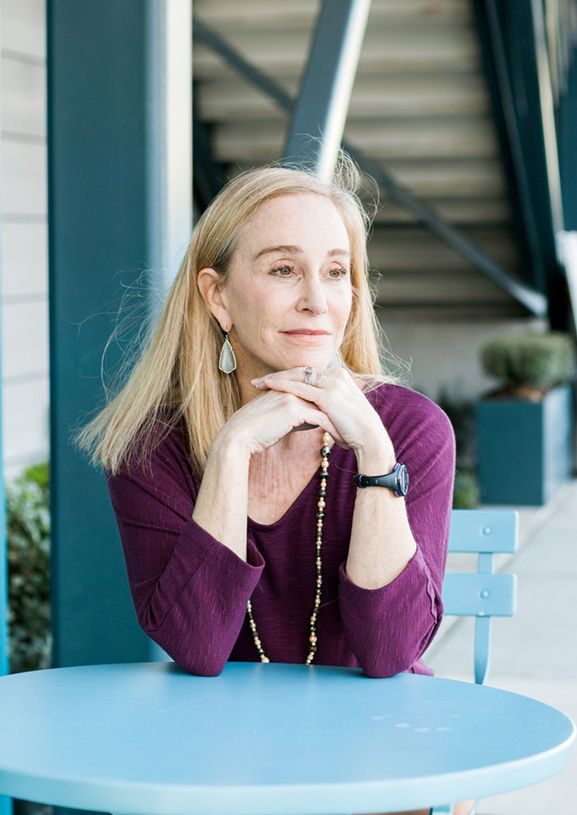Is Your Mind Stuck
on Asking Why?
Then Stop Seeking. Try Helpful Action Instead.


Caryn Honig
Caryn Honig
On March 9, 2022, Caryn Honig was feeling uneasy about her dad. Pandemic isolation had been challenging for Morton Honig (called “Poppy” by many). A noticeable depression was hanging on after his own bout with COVID, and other ailments were starting to threaten his independence.
Still, there had not been a clear hint. No way to anticipate.
“I kept calling and he wasn’t answering so I drove over,” Honig said. That was how she became the one to find her beloved father. He had died by suicide.
Up until that point, Honig was enjoying a thriving practice as a licensed dietitian specializing in eating disorders. With master’s and doctorate degrees in education, she is a University of Houston adjunct professor of nutritional counseling, now for 18 years, in UH’s Department of Health and Human Performance. There, she inspires future health care providers to treat patients and clients with compassion and empathy around food, emotions, body image and other human frailties.
That didn’t mean she could stop the hopelessness and depression that her father felt. It also didn’t mean that she could stop her own feelings of deep sadness and grief.
“There is such a ripple effect. No one is left unaffected by suicide. The family and friends, the community, all feel the weight – too often on our own,” she said. “That can change if we connect and say, ‘You are not alone’.”
To end the big silence, Honig said, we must straightforwardly address the delicate subject of suicide.
According to the CDC’s most recent data, 48,183 people died by suicide in the U.S. in 2021 – one every 11 minutes. The same year, another 1.7 million adults in America tried to end their lives; 12.3 million thought seriously about doing so.
This is not the first journey for Honig’s family. Four decades before, her maternal grandfather (also called Poppy) died by suicide too.
There has been progress since then. Mental health issues are more discussed and counseling has gained acceptability. But a hush remains around the topic of suicide, not only among people at risk but also loved ones left struggling over why it all happened.
“My UH faculty colleagues and students have been incredibly helpful, too, always supporting me.”
-Caryn Honig

A year ago, Honig started Poppy’s Run for Life 5K to raise funds and spread the word about the risks of depression. The decision wasn’t obvious. After her father’s death, she was hampered by pain, grief and doubt.
“It was so painful, and I still miss him so much. I couldn’t find joy, I couldn’t find happiness.” She turned to her faith for guidance.
“‘What’s the point?,’” she asked her rabbi. “‘I have a wonderful husband and two beautiful daughters, a promising career, but I can’t find happiness anymore.’” His response shocked her.
“‘I don’t want you to look for happiness,’ is what he told me. ‘I want you to find a purpose and find meaning.’”

Establishing Poppy’s Run for Life helped Honig accept the new reality. “It keeps alive memories of my father and grandfather, and it offers help to others,” she said. “Through the darkness and pain has come so much light. I’ve met the most incredible people who have stepped up to help. There is a lot of hope.”
She closed her 20-year private practice to focus on her new advocacy and teaching at UH. Standing beside her have been her “incredibly generous and supportive husband” Scott, their two grown daughters and their tight knit group of friends and family.
“My UH faculty colleagues and students have been incredibly helpful, too, always supporting me,” she said.
This year, the second annual Poppy’s Run for Life (March 17) adds a 1K option for people who are less mobile or just want a shorter run or walk. UH nutrition student Gavin Andrade will sing the national anthem. Local entertainer Rich Latimer will offer other music and entertainment.
Donations will support local nonprofits that prioritize mental health services.
It would be nice to say that all is well at this story’s end, but that’s not how life really works. For Honig and her family, the grief lingers and the sense of loss still weighs on their hearts.
But finding new purpose and honoring the two Poppys give reasons for family and community to smile. As Honig has come to understand, there is joy in outshouting the big silence. And there is happiness, at last, in witnessing old stigmas fade backward, one small run at a time.

Caryn Honig
Caryn Honig
